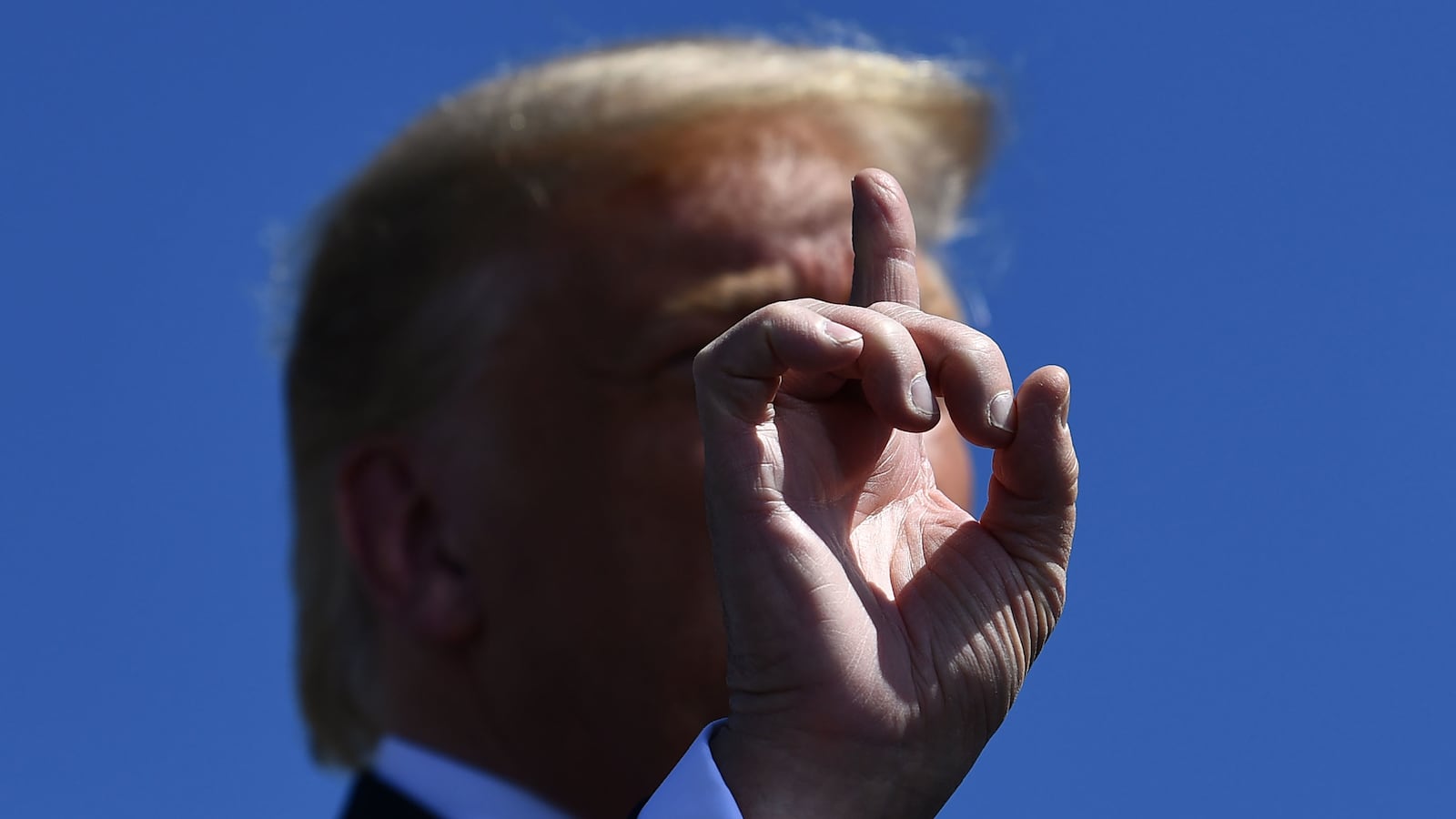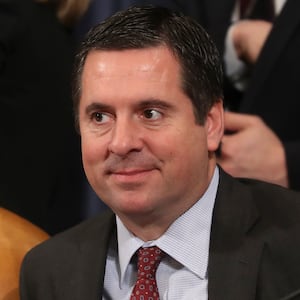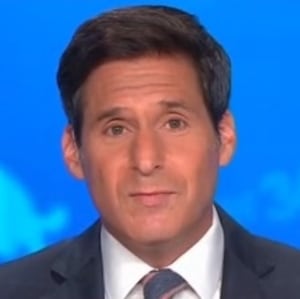President Donald Trump and other top government officials teased a new, conspiracy-fueled crackdown on Black Lives Matter and antifascist protesters this week. Their legal grounds to do so are shaky—but the underlying threat is real.
In a Monday Fox News interview, Acting Department of Homeland Security Secretary Chad Wolf, a villain on the left for his agents’ use of unmarked vans to detain people in Portland, Oregon, suggested using a racketeering law to go after activists.
In a Tuesday Fox News interview, President Donald Trump suggested, without evidence, that activists were being paid to fly to protests, and said the alleged incident was “under investigation right now.”
Can the U.S. government really use the Racketeer Influenced and Corrupt Organizations (RICO) Act, mostly known as a weapon the feds use to target mob bosses, to successfully prosecute protesters, as Wolf implied? It wouldn’t be easy, legal experts say. But the chatter signals a potent new effort—bolstered by extra-deranged conspiracy theories—to crack down on protesters, and may already be having its desired effect: freaking people out.
In his Monday night interview with Wolf, Fox News host Tucker Carlson asked “Why haven’t we seen the leaders of antifa and BLM arrested and charged with conspiracy under, say, RICO like the heads of Mafia families were?”
“Well, this is something that I have talked to [Attorney General William Barr] personally about,” Wolf, the acting DHS head replied. (Congress’s independent Government Accountability Office announced last month that Wolf, who has not been officially confirmed to his post, is ineligible to serve in his current role.) “I know that they are working on it.”
Wolf said the DOJ was investigating “the heads of those organizations” as well as those “paying for individuals to move across the country.”
The notion that someone is paying people to travel to the many racial justice protests that swept the country after George Floyd’s death in Minneapolis Police custody—and gained new energy after the shooting of Jacob Blake in Kenosha—is completely unfounded. The conspiracy theory is often coupled with anti-Semitic tropes, falsely accusing Jewish philanthropist George Soros of paying people to travel.
Nevertheless, Trump appeared to cite a version of the theory the following day in his own Fox News interview, in which he claimed that he’d heard reports of someone getting on a plane surrounded by people in “dark uniforms, black uniforms with gear” headed to a protest, implying they had been paid. Trump said the alleged incident was under investigation, even as he changed details of it across two tellings.
Wolf and Trump aren’t the only prominent Republicans in the government alleging a conspiracy by protesters and calling for an investigation, perhaps on RICO grounds. In a Fox News op-ed this week, Sen. Rand Paul accused someone of paying for protesters’ hotel rooms and flying them around, after he had his own run-in with protesters who surrounded and shouted at him outside the Republican National Convention last week. And last July, Sen. Ted Cruz wrote a letter calling on Barr and the FBI to open an investigation into the anti-fascist movement “under the RICO Act.”
Allusions to RICO, a broad law intended to target organized crime, are largely bluster, says Ken White, an attorney and former federal prosecutor who focuses on First Amendment law.
“It was useful, and still is sometimes, at taking down genuine organized crime,” White said of RICO cases. “The problem is that [“RICO”] sounds badass so people want to use it on everything. People basically use it like an angry emoji… I think 98 percent of the time it’s invoked, it’s more emotional or performative than it is substantive.”
On Wednesday night, Trump also signed a memo purporting to reduce or limit federal funds to cities he decreed to be “anarchist jurisdictions,” including New York, Washington, D.C., and Portland. The White House said it would release a full list of affected cities within two weeks.
Whatever the viability of that project, the nature of the Black Lives Matter and anti-fascist movements would make them difficult to target with a criminal RICO case, according to Chip Gibbons, policy director for the advocacy group Defending Rights and Dissent.
“When [Wolf] says they’re looking at the leaders of Black Lives Matter for RICO charges, who do they mean?” Gibbons said. “Do they mean the board of trustees on the actual 501(c)(3) [nonprofit] organization? Do they mean the three individuals who are credited with coming up with the hashtag? These are pretty decentralized movements… How are we going to subpoena the hotel records of antifa? It’s a nonsensical proposition, like if I said I’m going to subpoena the hotel records of feminism.”
Despite “antifa” referring to a set of tactics more than any group, there are organized groups of anti-fascists—and official chapters of Black Lives Matter—throughout the country. That makes them more vulnerable to legal challenges than rank-and-file protesters at a rally.
PopMob, a Portland-based group of self-described “everyday antifascists,” said the threats were an attempt to stifle and mischaracterize the left.
“The vast majority of anti-fascist work revolves around research, mutual aid, and community self-defense,” the group told The Daily Beast. “Folks in positions of power who benefit from authoritarianism and nationalism are desperate to attack this work because we challenge so much of what they represent.”
Still, the difficulty of prosecuting RICO criminal cases hasn’t stopped people from employing a civil element of the act to—unsuccessfully—sue leftist protesters in recent years, Gibbons noted.
“There’s been a number of civil suits brought against environmental groups,” he said, referring to cases filed against Greenpeace, and against protesters who opposed the construction of an oil pipeline on the Standing Rock Indian Reservation. Those cases were tossed, but not without headache for the activists targeted.
“It was based on the same idea: that big, sinister NGOs were funding paid rioters,” Gibbons said,
Those accusations of conspiracy, waged by oil interests in Standing Rock, are now being levied by government officials against anti-fascists and Black Lives Matter activists engaged in protests against racism and police brutality.
Faiza Patel, co-director of the Liberty and National Security Program at the Brennan Center for Justice, said the basis of those claims can mean trouble for protesters, even if RICO charges don’t stick.
“One of the things this administration has tried to do is label protesters as part of some criminal organization,” Patel told The Daily Beast, “because once you have the idea of an organization, then that makes it a lot easier to go after people who are related. You might not necessarily have to get the individual person who might have committed a crime; you can actually treat the entire group as being dangerous or criminal. And that gives you a lot more leverage in going after its members.”
The Trump administration has repeatedly signaled interest in designating antifa—a broad, unaffiliated anti-fascist movement—as a terrorist organization. Although the move would come with its own legal hiccups (no such domestic terror designation exists, even though a leaked document suggested the DHS was trying to designate it as a foreign terror group), if successfully achieved, it could enable new surveillance and repression.
The state has plenty of discretion to prosecute protesters already, as Patel noted. This year, Attorney General William Barr pledged to use Joint Terrorism Task Force resources to “identify people in the crowd, pull them out, and prosecute them.” Trump on Monday also announced a partnership between the DHS and DOJ to investigate “left-wing civil unrest,” although details on the program—including whether it already exists—are unclear. Neither agency returned a request for comment on Wednesday.
And even if prosecutors could make a legitimate conspiracy case against protesters, those prosecutors would probably just use what White described as more “vanilla” conspiracy laws. It should also be noted that none of the charges in the initial wave of protest arrests earlier this year mentioned anti-fascists, despite Trump’s repeated references to that scene.
PopMob, at least, told The Daily Beast that the new threats would not keep them from protesting. Nevertheless, the allegations of conspiracy act can help stifle dissent.
“It’s about intimidation,” Gibbons said. If the DHS and DOJ announce—on Fox News, anywhere visible—that they plan to investigate and charge protesters, he said, some would-be activists might reconsider attending demonstrations.
“If you’re a normal person and you’re disgusted by police racism, but you think, ‘If I go out and protest, is the FBI going to open a file on me?’ You might think twice about doing so.”








